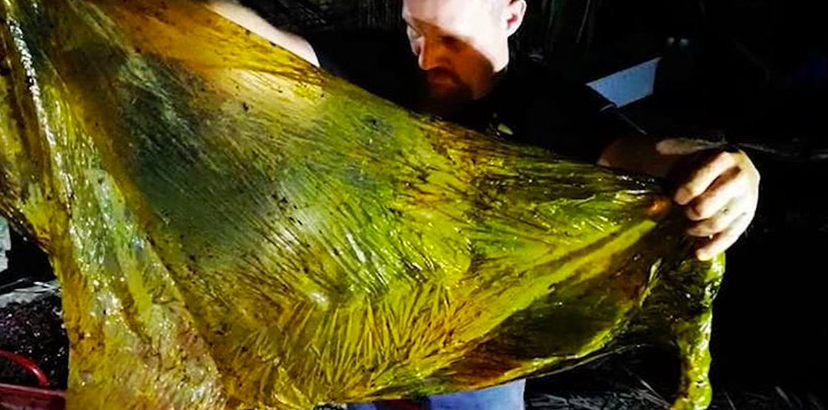
Plastic Removed From Dead Whale in the Philippines Photo: D’ Bone Collector Museum Inc., CNN
Whales around the globe face numerous threats as has become apparent in recent weeks. Just this past weekend a young Cuvier’s beaked whale that was weak and vomiting blood washed up on the shore in Mabini, Philippines and eventually died. When the government performed a necropsy yesterday, it found a gruesome sight — 88 pounds of plastic in the whale’s stomach. Darrell Blatchley, a scientist who performed the necropsy said of the whale’s stomach, “It was full of plastic — nothing but nonstop plastic. It was compact to the point that its stomach was literally as hard as a baseball. That means that this animal has been suffering not for days or weeks but for months or even a year or more.”
Meanwhile, on the U.S. West Coast, ten whales died in 2018 due to contact with ships, which was a record, according to The Washington Post. Ordinarily, three or four whales are killed each year due to ship strikes along the Pacific coast of the U.S., but there are few rules in place to guard against such fatal accidents and cargo ships are increasingly large and don’t even see the whales when they hit them. Five of the ten whales killed were of species that are considered at risk of extinction — one dead whale even remained slung across the bow of the ship that hit it all the way into San Francisco Bay. Most whales, however, are struck and then sink to the bottom, leading conservationists to wonder whether “If we had all these whales floating around on the water and showing up on beaches nobody would stand for this,” said Michael Fishbach, executive director of Great Whale Conservancy.
Finally, Iceland announced late in February that it intends to hunt 2000 whales over the next five years, granting itself a permit to kill whales and sell the meat despite an international moratorium on commercial whaling that has been in effect since 1986. Iceland has conducted commercial hunts for the last several years but has not taken whales in these numbers in the recent past. Iceland defended its action saying that the new whale quotas are sustainable based on research from the nation’s Marine Research Institute and the University of Iceland, but conservation groups cried foul. Unfortunately, visitors in Iceland enjoy whale watching tours and then are served whale meat in local restaurants.
Why This Matters: Whale conservation efforts globally remain spotty at best. Plastic pollution in the ocean and ship strikes likely kill far more whales than whale hunters do — but all three of these things happen far too much. The International Whaling Commission, which has long been a forum for disagreement about whaling, may now focus its efforts on conservation because Japan has announced it is leaving the Commission in a few months, and thus the main proponent of whaling will no longer be active there. Other international organizations, such as the International Maritime Organization, which regulates commercial shipping globally could do more to protect whales by requiring ships to slow down in areas where whales are known to congregate. And the U.S. government could put more rules into place on the West Coast like those on the East Coast requiring ships in whale critical habitat to slow down.
March 19, 2019 » hunting, Iceland, International Whaling Commission, plastic pollution, ship strikes, whales


